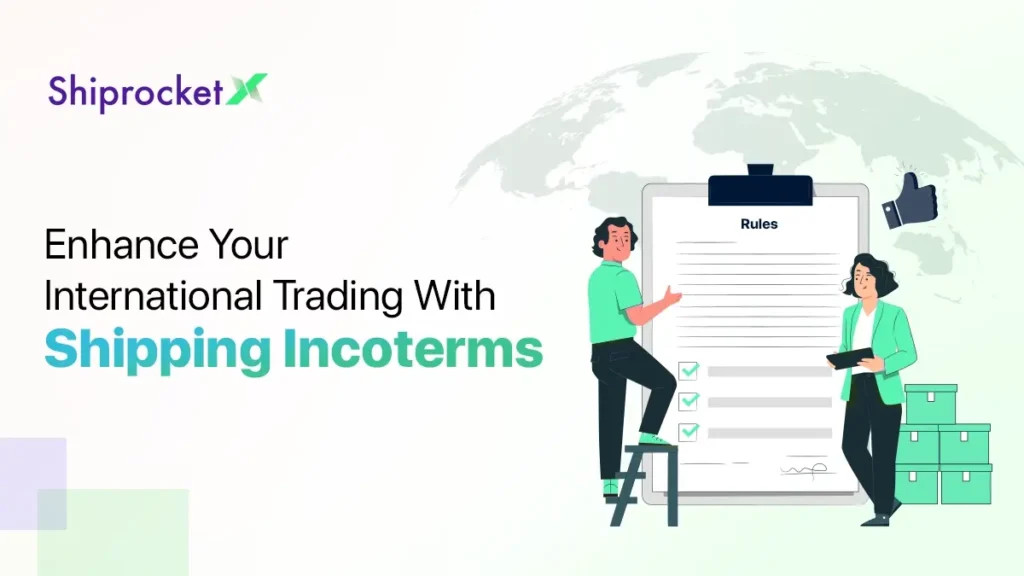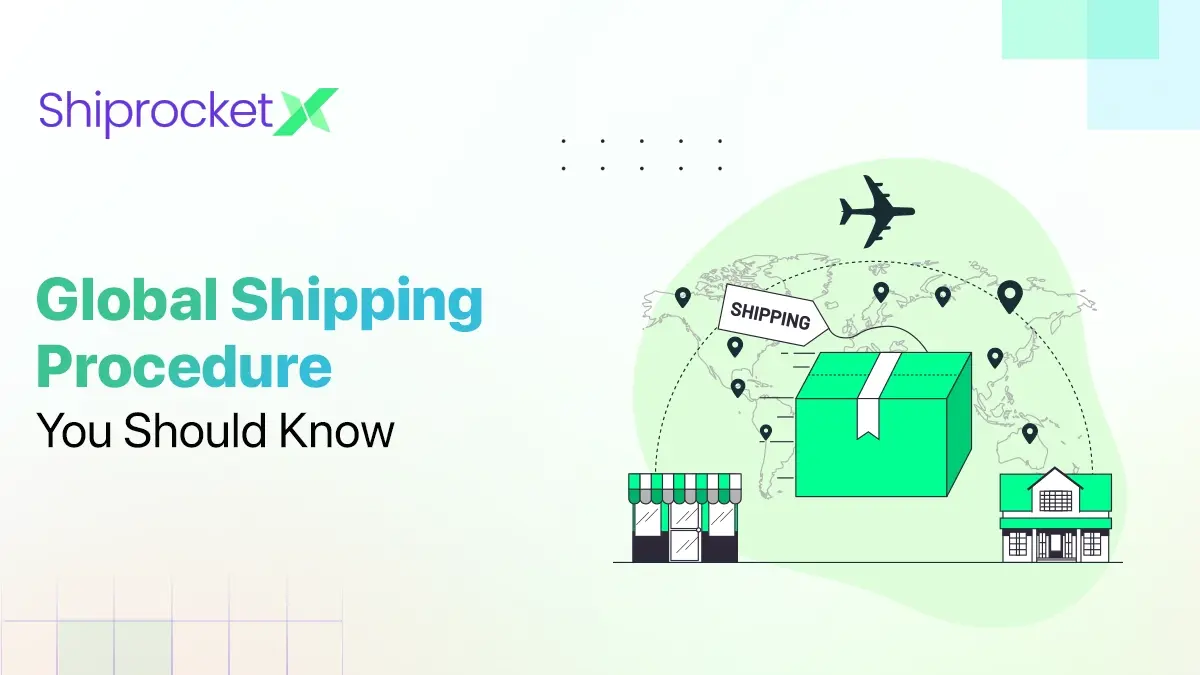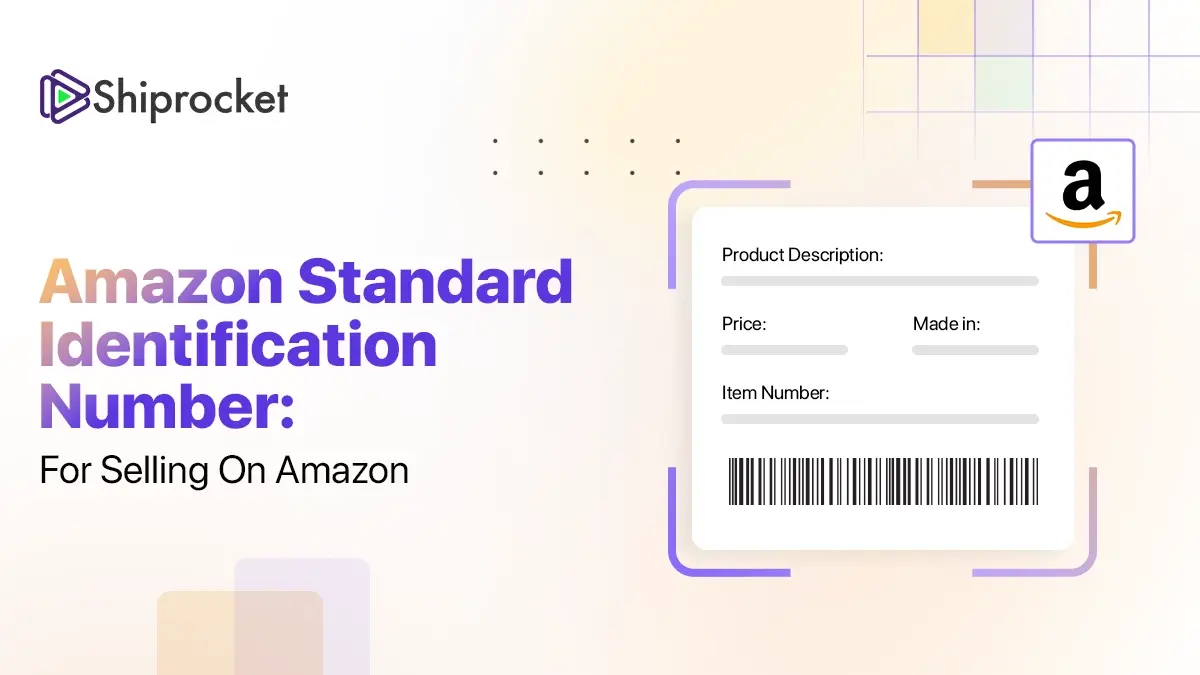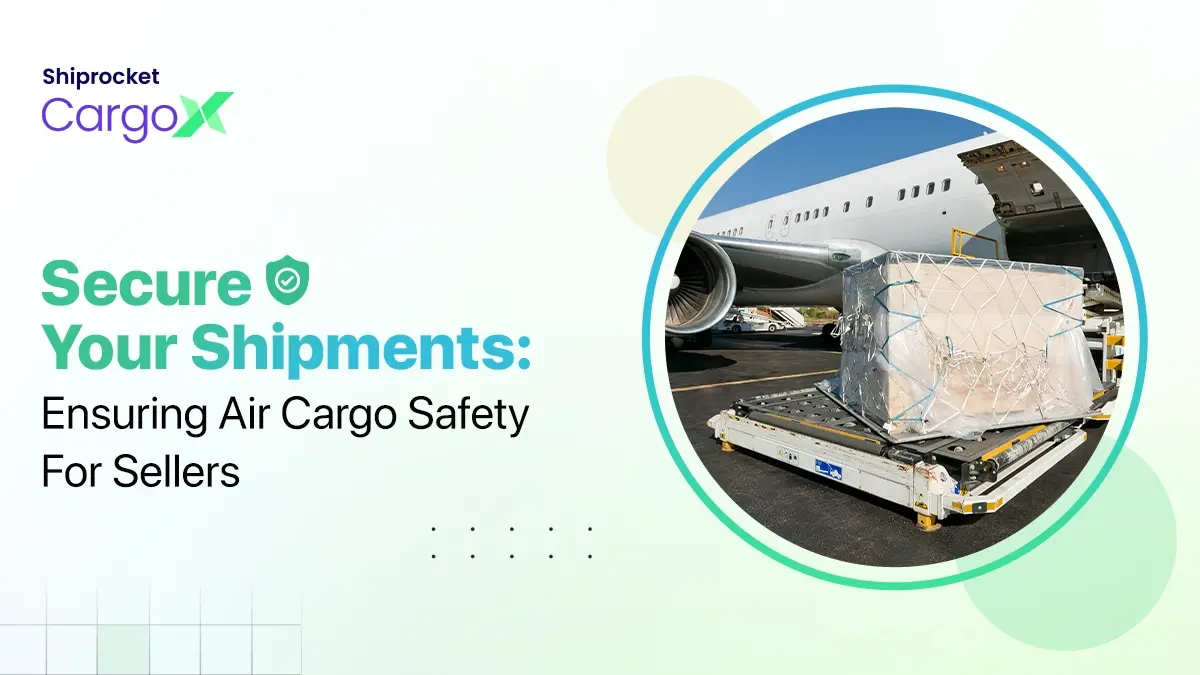A Handbook on Shipping Incoterms Guiding International Trade
The movement of goods from one source to another is more cumbersome in international trade. With customers increasingly inclining towards buying online, the eCommerce world needs more transparency at every step of the delivery process. When imported or exported, goods travel through oceans and air to cross various borders and reach the end customer. The multiple destinations involved in the process make it tedious and difficult to deal with.
To combat this complexity in international trade and to make it fair, the International Chamber of Commerce (ICC) introduced shipping Incoterms. Businesses trading domestically and internationally usually use these Incoterms as a tool to enhance understanding among each other and to define the exact terms of their trade arrangements. While some Incoterms may apply to different means of transportation, others specifically apply to water transportation.
Incoterm codes dictate the flow of cross-border shipping, and for eCommerce businesses dealing in global trade, decoding them is a strategic move to make deliveries highly efficient. In this article, you’ll learn in detail about the classes and types of Incoterms used by eCommerce and other businesses for trading beyond borders.

What are Incoterms in International Trade?
Short-form for International Commerce Terms, Incoterms are a universal set of 11 internationally recognized rules that state the responsibilities of buyers and sellers conducting business globally. As these Incoterms are recognized globally, they prevent any confusion in foreign trade contracts and clarify the obligations of sellers and buyers. These rules help bridge the gap between them and minimize misunderstandings in trade agreements.
In a nutshell, shipping Incoterms has become a common language that traders may use for setting their trading terms. These rules are fit for managing several essential activities in conducting business globally. Some activities that could use Incoterms include labelling a shipment for transport, filling out a purchase order, documenting a free carrier agreement, or completing a certificate of origin.
Shipping Incoterms clearly define which party is responsible for what during the export-import process, covering every aspect from transportation, customs duties, and insurance to the point-of-delivery and risk transfer. Standardizing the facets of trade agreements with these rules reduces potential disputes and uncertainties that may arise due to different expectations and misinterpretations of shipping terms in various countries.
Each shipping Incoterm highlights specific responsibilities and obligations for buyers and sellers:
- The point of delivery section defines the destination where the seller transfers the products to the buyer.
- The Freight Prepaid or Freight Collect component that outlines which party will be responsible for transportation costs defines if the seller or the buyer will handle all the freight costs.
- The EXIM requirements section dictates if the buyer or the seller is responsible for managing costs and facilitating the export and import of the shipment.
- The freight insurance responsibility: A few Incoterms require freight insurance. Every shipping Incoterm defines who pays for freight insurance for the cargo.
The International Chamber of Commerce (ICC) introduced these Incoterms in 1936. It periodically updates them to keep pace with changing trade practices. The mission of ICC is to push open markets and achieve global economic prosperity through trade.
The vast network of business organizations that form the ICC reaches over 45 million companies in more than 100 countries. With such an enormous network, ICC has unmatched expertise in establishing rules to facilitate global trade. Although applying these terms in international business is optional, many buyers and sellers use shipping Incoterms regularly to carry out trade transactions smoothly.
The Two Classes of Incoterms
There are mainly two classes of shipping Incoterms that categorize the mode of transportation and lay rules accordingly. Here are they:
Shipping Incoterms for Any Mode of Transport
The ICC delegated seven terms that effectively apply to all modes of transportation, from sea and air to road and rail. They are perfect for the diversified shipping practices prevalent in our fast-paced and globalized economy. These shipping Incoterms offer much flexibility in catering to different transportation methods businesses use to ship goods globally. The seven Incoterms for all modes of transport are:
- Ex Works (EXW)
- Carriage and Insurance Paid to (CIP)
- Delivered at Place (DAP)
- Delivered at Place Unloaded (DPU)
- Delivered Duty Paid (DDP)
- Free Carrier (FCA)
- Carriage Paid to (CPT)
Shipping Incoterms for Sea and Inland Waterway Transport
There are terms dedicated explicitly to transporting goods from one destination to another through sea and inland waterways. The ICC designed these shipping terms to manage maritime shipping processes like loading and unloading the cargo at different destinations. These shipping Incoterms are useful when addressing heavy and bulk cargo moving through the sea.
- Cost and Freight (CFR)
- Cost, Insurance, and Freight2 (CIF)
- Free Alongside Ship (FAS)
- Free on Board (FOB)
Common Incoterms Associated With International Trade
Let’s understand the common shipping Incoterms that provide guidelines for conducting international trade:
Delivered Duty Paid (DDP)
Delivered Duty Paid (DDP) bends towards the seller party and levies most of the obligations on the seller. It refers to the trade agreement where the seller is responsible for delivering goods, preparing for unloading, and bearing all costs and risks involved in the transportation process. These costs may include taxes, customs duties, and miscellaneous charges.
Under the DDP shipping Incoterms, the seller must ship goods to the buyer’s country while managing the logistics, duties, taxes, and customs clearances involved in the process. The seller must acquire information and knowledge about the import regulations and procedures to follow in the buyer’s country. The buyer ensures the unloading of goods as the shipment arrives at the agreed-upon destination and accepts delivery.
Delivered at Place (DAP)
While drafting a shipping Incoterm agreement, the buyer and seller agree upon a particular destination where the seller will deliver the goods. On signing the DAP contract, the seller must deliver the goods to the decided-upon destination, ready to unload at the disposal of the buyer. However, DAP requires the seller to handle all costs and risks involved in transporting goods to that destination, except unloading. The buyer must manage the unloading process and deliver the goods to the final destination from the named place.
Hence, buyers must adopt the DAP trade contract if they want to look over the import formalities or in cases where sellers cannot manage import clearance owing to regulatory challenges.
Delivered at Place Unloaded (DPU)
Delivered at Place Unloaded (DPU) was known as Delivered at Terminal (DAT). If the seller can handle the unloading process at the agreed-upon destination, DPU is the ideal choice for a shipping contract. Unlike DAP, the seller is also responsible for unloading after delivering the goods to a predetermined destination as per the trade document under the DPU agreement.
The DPU shipping Incoterms require the seller to manage the entire transportation costs and potential risks, including the ones relating to unloading at the agreed-upon place. The responsibility transfers to the buyer after the shipment container arrives at the named destination. This type of contract is well-suited for large-scale projects where the standard shipping terminal is not the delivery destination.
Carriage and Insurance Paid (CIP)
A term flexible to use across all transportation modes, the Carriage and Insurance Paid (CIP) is a shipping Incoterm that allows a seller to deliver the shipment to a carrier of their choice. However, the seller is responsible for paying for the carriage and insurance for the agreed-upon destination per the CIP contract.
The seller must purchase insurance against the buyer’s risk of damaged or lost goods in transit. The amount for procuring this insurance is usually negotiable. However, the parties must ensure the CIP agreement mentions the insurance coverage amount.
Carriage Paid To (CPT)
Like several other shipping Incoterms, sellers and buyers can use the Carriage Paid To (CPT) for all transportation modes. Under this agreement, the seller is supposed to pay the freight for transporting goods to the agreed-upon destinations as defined in the trade document. However, the seller is only responsible for the pre-carriage and carriage to the decided delivery point and not for bearing the risk while the goods are in transit. Instead, the buyer manages all potential hazards after the first carrier receives the shipment.
In specific international deals, the buyer may want the seller to arrange transportation at the initial stage but take over control as the goods are shipped. The CPT shipping Incoterms are suitable for such buyers.
Cost and Freight (CFR)
Under the Cost and Freight (CFR) Incoterms, the seller needs to clear the shipment for export, load it on the ship at the departure port, and pay all transportation costs at the agreed-upon destination, as the trade contract mentions. The buyer bears the risk once the seller delivers the goods on the ship.
After that transaction, the buyer must manage all additional transportation charges from the destination port. These charges may include import clearance and duties. Importers and exporters can only use the CFR agreement for sea or inland waterway transport.
Cost, Insurance, and Freight (CIF)
Like CFR, the Cost, Insurance, and Freight (CIF) applies only for sea or inland waterways transport. Sellers and buyers often use CIF for their sea freight. Under this contract, the seller clears the goods for export, delivers and onboards them on the departure vessel, and handles the carriage and insurance costs to the decided-upon delivery destination. The buyer manages the additional costs like import duties, taxes, and the risks involved after the vessel boards the shipment.
Ex Works or Ex-Warehouse (EXW)
The Ex-Works or Ex-Warehouse (EXW) contract is where the tables turn, and the responsibility shifts more to the shoulders of the buyer. This shipping agreement is also meant only for ocean and inland waterways transport. Under the EXW agreement, a seller’s responsibility ends on making the goods available at the departure port or starting point. They are devoid of the obligation to load the goods on the shipping vessel and clear them for export.
On the other hand, the buyer assumes responsibility from that point forward and handles all costs and risks, including loading goods at the seller’s destination and paying any other charges involved. The buyers with the resources and ability to manage logistics in the seller’s country usually opt for the EXW shipping Incoterms.
Free On Board (FOB)
According to the Free On Board (FOB) shipping Incoterms, the seller takes charge of loading the goods on board a ship selected by the buyer. The buyer bears the entire risk from this point onwards. However, the seller is responsible for clearing the products for export and onboarding them onto the vessel. When the goods are on the ship, the buyer settles all costs and risks involved in the transit.
Free Carrier (FCA)
When parties sign the Free Carrier (FCA) contract, the seller has the task of clearing the shipment for export and delivering it to the carrier appointed by the buyer at an agreed-upon place between the buyer and the seller. The seller then hands over the products to the buyer’s carrier. Once the carrier has received the goods, the buyer then takes full responsibility from there on. The buyer bears all transportation costs and handles the carriage and insurance. FCA is flexible for use in any transportation mode and is perfect for containerized goods where the buyer needs control over the transport and costs.
Free Alongside Ship (FAS)
Free Alongside Ship (FAS), another type of shipping Incoterms designed for ocean and inland waterway transport, requires the seller to deliver the goods right next to the ship at the destination stated in the contract. The seller must also clear the goods for export and place them on the departure ship’s side.
Meanwhile, the buyer latches on all the transportation responsibilities, including loading the goods onto the vessel and subsequent transport. The FAS agreement is ideal for bulk or heavy cargo where the buyer wants to handle the loading process.
Benefits of Incoterms in International Trade
Adopting shipping Incoterms for conducting trade worldwide has considerable advantages. Here are some of the significant benefits:
Effective Communication Between Countries
Shipping Incoterms make international trade relatively easier by clarifying the trade regulations that a country might have. Each country has unique trading practices that need attention before reporting or importing goods. Moreover, the ICC, which has complete autonomy and no single government controls it, sets these Incoterms. This simplifies the adoption of global trade.
Besides that, the shipping Incoterms enable legal transparency between buyers and sellers from various nations by standardizing rules that are identifiable through standard codes for all transportation modes.
Financial Management of International Trade
The shipping Incoterms help businesses greatly by clearly stating the cost and liability of each party involved in the trade agreement. They also pen down the legal responsibilities of the buyer and seller. Financial clarity is one of the most significant advantages of shipping Incoterms.
Incoterms are good at delegating responsibilities to the seller and buyer and establishing liability. For instance, they state which party will take care of the cargo at different delivery points during the shipping process. The responsible party must pay all or partial costs or purchase insurance for the merchandise to protect against loss or damage risks.
Other costs like transportation, bill of lading, customs duties, taxes, and more also become transparent with shipping Incoterms. This transparency reduces the friction between importers and exporters.
Supply Chain Management and Control
The use of Incoterms by businesses allows them to have less or more control over the shipping process. The trade agreement clearly defines the level of control a seller or buyer may have on the cargo. For instance, when you arrange the shipping or loading, you can choose the carriers and ports for your cargo.
This level of influence may impact your trading process significantly. It may even allow you to choose a delivery port based on its capability to manage the ships that arrive efficiently.
Selecting the Right Incoterm For Your Business
There are several factors businesses must consider before choosing the type of shipping Incoterms best suited for them out of the 11 shipping Incoterms:
Suitability of Incoterm for Import or Export
A business needs to determine if the specific Incoterm is suited for export or import business. For example, the EXW Incoterm is good for Exporters. Here, the seller becomes responsible for the cargo when the merchandise is ready for pick up from their destination. Other good options for exporters include FAS, FCA, and FOB.
The DAP, DUP, and DDP Incoterms are suitable options for importers. The buyer’s role begins after the shipment arrives at the agreed-upon destination.
Expertise of Both Parties
When conducting international trade, the experience of sellers and buyers in the trade matters. An experienced importer and exporter would know which Incoterm would be best for the trade. For instance, EXW Incoterm is good for a buyer with more experience importing goods. The DDP, DPU, and DAP Incoterms suit the importers with less experience.
Merchandise Type
A business must consider the type of goods it’s trading when choosing the right shipping Incoterms. Different shipping Incoterms cater to varying needs. For example, depending on their nature, some products may need express or fast delivery. Other products may be fit for standard delivery.
Transportation Mode for Trading
There are two classes for shipping Incoterms. One class covers the Incoterms applicable for any mode of transport, while the other only caters to sea and inland waterways. A business must pick the right shipping Incoterms depending on its logistics and preferred transportation mode, as selecting the right Incoterms prevents unnecessary delays.
The FAS, FOB, CFR, or CIF shipping Incoterms cover sea and inland water transport. Meanwhile, the EXW, CIP, CPT, DDP, and DAP Incoterms may be best for air freight.
Need for Insurance Cover
Both parties need to ensure that the merchandise travels and is delivered safely. They must insure the goods to protect them against damage and loss risks. Hence, the parties must decide who purchases the insurance cover and select the correct shipping Incoterms accordingly.
Control Over the Shipping Process
Importers and exporters must factor in the influence they need over the cargo before choosing. For instance, ExW Incoterms give more control to the importer, and the CPT and CIP offer higher control to the exporter.
Conclusion
As businesses manoeuvre global trade in these fast-paced and ever-changing times, they need a more streamlined framework to conduct the trade fairly. There may be many hurdles and miscommunication while exporters and importers deal with each other. The ICC birthed shipping Incoterms to solve the issues that might occur while transporting goods across countries. These Incoterms mainly include two classes, of which one dictates the shipping Incoterms for all transportation modes, and the other class covers Incoterms guiding sea and inland waterways transport. There are 11 shipping Incoterms for different scenarios that buyers and sellers can and must use to make their international shipping more transparent and effective.
The International Chamber of Commerce (ICC) updates the shipping Incoterms every ten years to adjust to the changing business needs. Their last update was in 2020. You can learn more about the latest Incoterms 2020 rules on the ICC website.
CIP and CIF, each of these terms have their requirements for the seller to obtain insurance. Under the Cost, Insurance, and Freight (CIF), the seller needs to purchase an insurance policy with a minimum cover of Clause C of the Institute Cargo Clause. Whereas it’s Clause A of the Institute Cargo Clause for the Carriage and Insurance Paid To (CIP)
Both the terms ‘Freight Prepaid’ and ‘Freight Collect’ are frequently used between buyers and sellers while discussing international freight on the cargo. These terms refer to one of the four Incoterms where the buyer has to collect and pay for all the freight costs.




